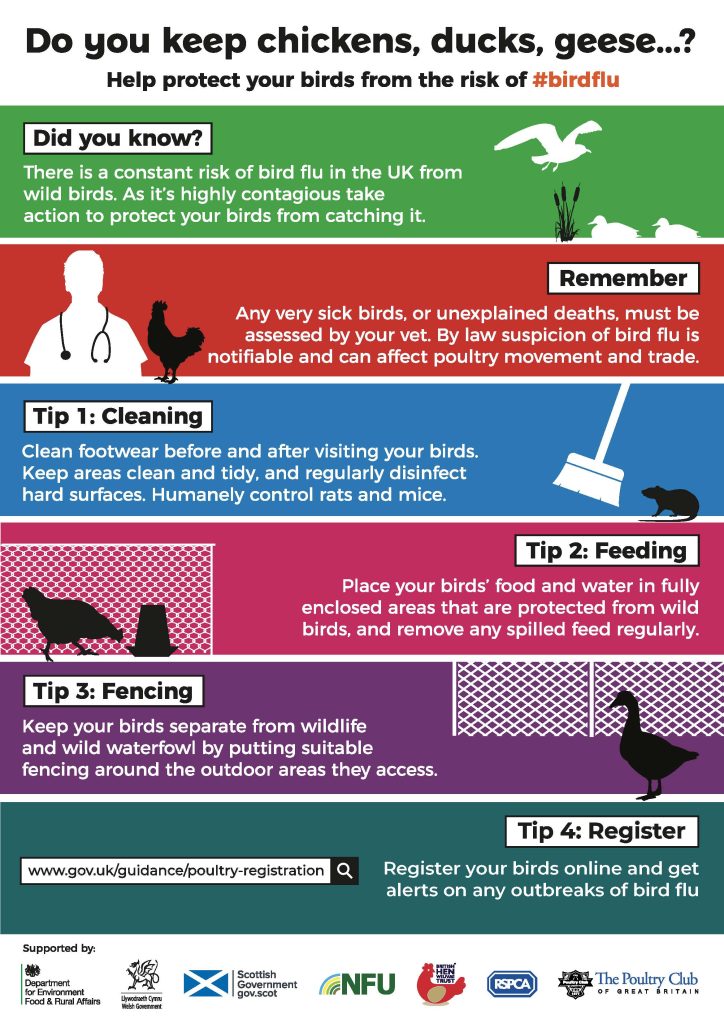Bird keepers urged to follow legal requirements and health advice to help stop the spread of avian flu
Bird keepers are being urged to follow legal requirements and advice to help contain the spread of Avian Influenza.
It comes after a number of confirmed cases of the virus in recent weeks, including a case in Wem.
Bird keepers are now legally required to keep their birds housed or fully netted, or seek veterinary dispensation, under new Government measures to control the spread of avian flu.
The new legal requirement for all UK bird keepers to keep their birds housed came into force on Monday 29 November 2021 in a bid to minimise contact with wild birds migrating from mainland Europe.

It is now a legal requirement for all bird keepers across the UK to keep their birds housed, and to follow strict biosecurity measures in order to limit the spread of the disease.
Biosecurity actions for poultry keepers (both commercial and recreational/back yard keepers)
There are some simple measures that all poultry keepers should take to protect their birds against the threat of avian flu. These apply to people running a large commercial farm, keeping a few hens in their back garden and those rearing game birds. These include:-
- Register your flock with DEFRA: this is a legal requirement where there are more than 50 birds, and advised if your numbers are lower
- Keep the area where birds live clean and tidy, control rats and mice, and regularly clean and disinfect any hard surfaces
- Keep chickens and turkeys completely separate from ducks and geese
- Conduct regular maintenance checks on their sheds
- Clean moss off the roofs, empty gutters, and remove vegetation between sheds where birds are kept
- Draw up contingency plans for storing bedding and dealing with pests
- Place birds’ feed and water in fully enclosed areas that are protected from wild birds, and remove any spilled feed regularly
- Put fencing around outdoor areas where birds are allowed, and limit their access to ponds or areas visited by wild waterfowl
- Clean and disinfect footwear before and after entering premises where birds are kept.
Avian influenza is not airborne, except over very short distances. It is spread by movement of infected birds or contact with respiratory secretions and in particular faeces, either directly or through contaminated objects, clothes and vehicles.
UK Health Security Agency has confirmed that the risk to public health is very low, and the Food Standards Agency has said that bird flu poses a very low food safety risk for UK consumers, and it does not affect the consumption of poultry or eggs.
Spot the signs of Bird Flu
- Unusual quietness, decreased activity levels
- Decreased levels of vocalisation
- Decreased levels of feed and water consumption
- Decreased egg production.
Bird keepers should report suspicion of disease in captive birds to the Animal and Plant Health Agency (APHA) on 03000 200 301.
My bird is sick, what should I do?
If you are concerned about the health of your pet, please seek advice from your vet.
For more information about bird flu and biosecurity, visit the Defra website at https://www.gov.uk/guidance/avian-influenza-bird-flu or phone 03459 33 55 77 for the Defra Helpline.
Register your poultry
You should register your poultry, even if only kept as pets, so APHA can contact you during an outbreak. This is a legal requirement if you have 50 or more birds. Poultry includes chickens, ducks, turkeys, geese, pigeon (bred for meat), partridge, quail, guinea fowl and pheasants.

Poultry registration

